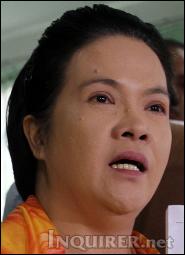MANILA — What’s wrong with a bar flunkee being the next magistrate of the Supreme Court?
Public Attorney’s Office (PAO) Chief Persida Rueda Acosta hopes to be an inspiration to 80 percent of the thousands of wannabe lawyers who fail the bar exams every year by applying for the summit of her legal profession.
Acosta failed the bar exams not once but twice and this issue cropped up during her interview with the Judicial Bar and Council that has started vetting candidates for the seat to be vacated by Associate Justice Jose Perez who would retire on December 14.
During her panel interview, Ma. Milagros N. Fernan-Cayosa, the representative of the Integrated Bar of the Philippines in the JBC, asked Acosta to comment on a survey feedback posed to the candidates: ”The records would show she took her bar more than once. No one has been appointed to the Supreme Court who has taken the bar more than once.”
Acosta said that as far as she knew, her “idol,” the late senator and Associate Justice Claro M. Recto took the bar twice and did not even land in the top 10 but still managed to succeed in his legal career and has been regarded as one of the best lawyers in the country.
“He (Recto) is my inspiration and I hope I will be one to other bar examinees who did not allow their poverty to stop them from achieving their goal of becoming lawyers and getting a chance to be modest instruments for justice,” said Acosta.
She pointed out that there were other notable judges and luminaries in the judiciary who were once bar flunkees like her but tried again, passed the licensure examination and eventually excelled as lawyers.
In a phone interview, Acosta admitted to having taken the bar exams thrice in 1987, 1988 and finally 1989 during which she ended up ranked four (former Defense Secretary Gilbert Teodoro was number one).
She said her two bar failures were due to poverty; her parents could not afford her tuition and other school requirements, forcing her to miss classes.
Acosta is the fourth in a family of nine children. Her father was a mini-bus driver in Bataan while her mother was a dressmaker. She’s proud to say that all of her siblings graduated from college despite their poor income.
Acosta was a scholar at the Ateneo de Manila University School of Law but she had to move out after her third year because her parents could not afford the school fees when she eventually lost the scholarship. She was able to enter the University of the East College of Law and graduated from there in 1987. “I lost my (Ateneo) scholarship and I couldn’t find enough time to work in order to finish at Ateneo. But Ateneo claimed me as their own when I topped the bar,” said Acosta.
“I did very well in class, I was valedictorian from elementary to high school and I had top honors in college and law school. I was really depressed when I failed twice and I thought of not taking it a third time. But my bosses at the judical court told me never to give up. And years after, here I am applying for the highest post a lawyer could ever strive for in our profession,” said Acosta.
Acosta has been nominated twice to the high court but she declined both times because she felt that she was not ready to take on the highest position in her career.
During her interview, Acosta, who was nominated by Sen. Miguel Zubiri, said her credibility in her 15 years of service as PAO chief was her biggest asset in applying for a Supreme Court seat.
Aside from Acosta, the other aspirants interviewed on the first day of the JBC panel are:
* Rita Linda Venture-Jimeno, associate dean of the Centro Escolar University’s School of Law, who was recommended by former President Fidel V. Ramos;
* Davao Regional Trial court Branch 13 Judge Rowena Apao-Adlawan; and,
* Court of Appeals Jutice Japar Dimaampao who was nominated by retired Supreme Court Justice Romeo Callejo and Autonomous Region in Muslim Mindanao Gov. Mujiv Hataman.
They were asked on their views on extrajudicial killings and the Supreme Court’s recent decision on the burial of the late President Ferdinand Marcos at the Libingan ng mga Bayani.
The JBC will continue its interview Thursday.
The seven-member JBC led by Chief Justice Maria Lourdes Sereno will draw up a short-list of nominees for the final selection to be made by President Rodrigo Duterte.
The Constitution requires that a Supreme Court Justice must be a natural-born citizen, at least 40 years of age, and with at least 15 years of court experience. SFM
